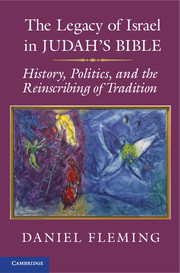Preface
Published online by Cambridge University Press: 05 August 2012
Summary
As we read the Bible, no matter how self-consciously careful we may be, it is natural to let it set our expectations, to provide the framework for understanding its contents. The narrative center of the Bible is a meandering account of the origins and experiences of a people named Israel. In a form that has been connected by various seams, this narrative begins with creation and Israel's ancestry in Genesis; continues through Moses’ leadership in Exodus, Leviticus, Numbers, and Deuteronomy; and then addresses the life of this people in its own land, through Joshua, Judges, Samuel, and Kings. These nine books have been called the Primary History, or the Enneateuch, and no matter the specific process by which they reached their finished form, their guiding story suffuses our sense of what the Bible offers for historical evaluation. Even the isolation of a “biblical Israel” from whatever existed in history defers to this overarching vision (Davies 1992).
One central idea in this biblical narrative has repeatedly drawn the critical attention of biblical scholars and historians: it has to do with a single people from beginning to end. The two kingdoms of Israel and Judah that are described in the books of Kings ultimately belong to one people of Yahweh, called Israel. Historians in particular have labored to use the Bible cautiously in their reconstructions, and nonbiblical evidence has played a greater role in recent years, especially as archaeology yields more material and drives historical analysis. A handful of nonbiblical texts present two kingdoms that are first visible in the mid-ninth century, first identified as Israel and the House of David and later treated by the Assyrians as Samaria and Judah. From these texts and the findings of archaeology alone, it is not clear how the two kingdoms were related. At this point, the Bible warrants a second look, because its story of a single people ends with an unexpected twist. When we reach 1 and 2 Kings, the last books in what I will call the Bible's primary narrative, the text describes a division into two polities, most often called Israel and Judah. The story begins with one people and takes for granted throughout the ultimate reality of a single people of the god Yahweh, but it ends with the same two kingdoms known from nonbiblical writing.
- Type
- Chapter
- Information
- The Legacy of Israel in Judah's BibleHistory, Politics, and the Reinscribing of Tradition, pp. xi - xviPublisher: Cambridge University PressPrint publication year: 2012



